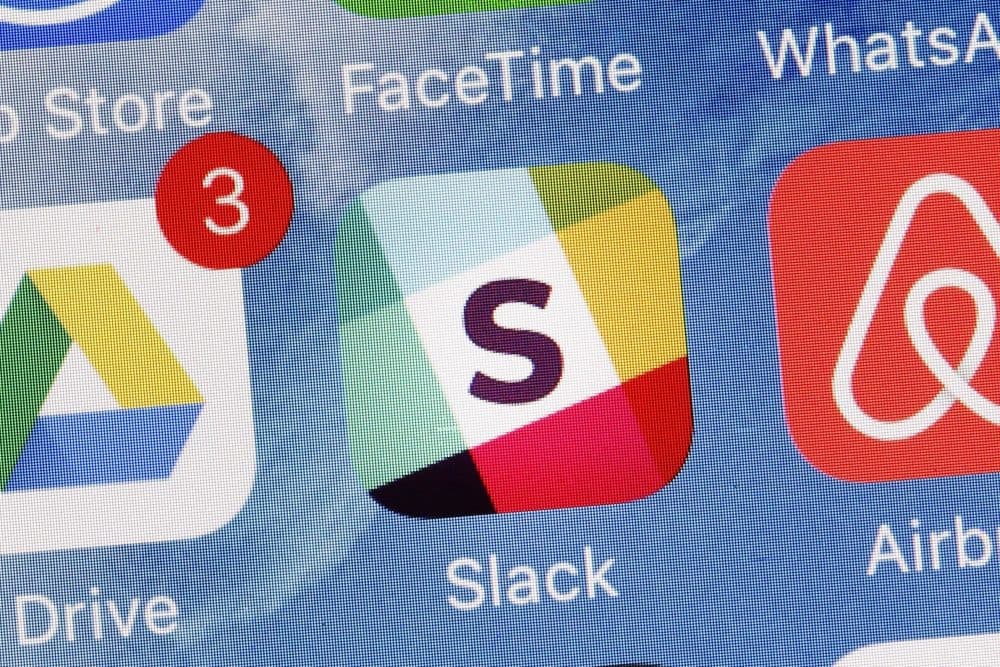Advertisement
How Slack Has Changed The Workplace
Resume
The messaging app Slack describes itself as "team communication for the 21st century." It lets people communicate online instantly in the office, individually or in teams. The company was valued at $3.8 billion in 2016 and says it has 5 million daily users.
Here & Now's Jeremy Hobson talks with Molly Fischer (@mollyhfischer), senior editor for The Cut at New York magazine, about how Slack has also brought a new kind of stress to the workplace.
Interview Highlights
On how Slack works
"Slack is essentially a chat tool. If you're familiar with AIM or [Google Chat], you can send direct messages to people you want to talk to. You can also have channels, so your workplace might have channels set up for different departments, or different projects or different teams. You open Slack, Slack greets you with a friendly message, it says something like, 'The day just got better, you're here! Your friends at Slack,' as it loads. And then you get a nice little bar with all the people you might want to talk to at your workplace, and all the conversations that are happening around you, and you can kind of hop around between them and talk through whatever you might have otherwise discussed over an email or in a meeting."
On Slack being used to cut down on email
"Everyone complains about email all the time, and so the idea of having something that would be an 'email killer,' something that would make email less burdensome for all of us, is enormously appealing I think to a lot of employers, and to a lot of employees. The tricky thing of course is that any tool, once you come to rely on it, and once it becomes a huge presence in your work day, can start to feel onerous in the way that email feels like a burden sometimes now. So, the open question is kind of whether Slack will, in time, become just as burdensome as email feels to some people."
On Gawker employees using Slack to discuss whether to unionize
"I think that [Slack] was a big part of how they came to that decision, and how that kind of unfolded for that group of co-workers. And a former Gawker employee described to me how, on one hand, you had these sort of big, almost voter guide-type chats that were happening in channels that pretty much everyone could view, where people walked through the pros and cons. And then you had sort of heated debates that happened in private channels and in [direct messages], where people were revealing their opinions, and how they really were thinking about this stuff and how they felt, and this employee was describing being really surprised by some of the things people were willing to say, and the sort of opinions that people were willing to air, and feeling like there was a willingness to be more direct and aggressive and intense than perhaps they would've been in a face-to-face conversation."
"The open question is kind of whether Slack will, in time, become just as burdensome as email feels to some people."
Molly Fischer
On how people feel about Slack
"I think people have at this point already kind of a love-hate relationship with Slack. I think — I hate to say this, because it sounds corny — it can be really fun. It feels good to be engaged with your colleagues moment to moment, talking through the things that you're interested in, or complaining about the things that are annoying you. But it does also feel like it's a constant barrage of notifications. But, I think if you work in an office that relies on Slack, it's easy to feel like you're not really participating in your workplace if you're not, sort of, present on Slack. If you seem like you're absent, you feel sometimes like you're a slacker, in the not-branded sense of the term."
On the name
"They arrived at the name, they liked the name, and then after having established the name Slack, and finding that they needed to explain why they had a workplace chat tool that was called Slack, they came up with the acronym, 'Searchable Log of All Communications and Knowledge,' which Slack of course is an acronym for."
This article was originally published on May 22, 2017.
This segment aired on May 22, 2017.